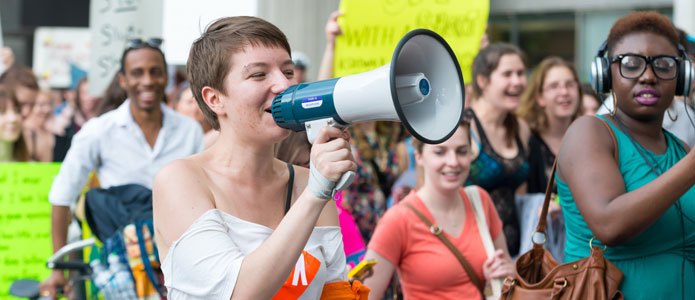Does something like global feminism exist? What issues concern women in different regions of the world? What is the relationship between feminist activists of different generations? An interview with the Italian-American philosopher Silvia Federici.
Ms. Federici, you celebrated your 75th birthday in 2017. Is it difficult for you to talk with younger feminists?
On the contrary! Most of the people I get to know these days are younger activists. I believe this has to do with the fact that there is a new feminist movement, worldwide. It is a great joy for me to be surrounded by these women, for the world is in their hands.
Is this new feminism simply just younger, or does it differ from the women’s movements of the 1970s and 80s in which you were active?
The activists have of course learned a lot in the meantime. To mention just one example: back then, we advocated “wages for housework”, whereas today the women have no illusions anymore about the liberation of women through paid labour. For although most women work, they have precarious jobs and often two or three of them if they want to survive. Moreover, young feminists put much less hope in state institutions as drivers of social change.
In January 2017 hundreds of thousands of women in the United States took to the streets for the Women’s March on Washington. What was your impression of that?
Not only feminists, many other social actors, both women and men, were involved on that day. The size of the march certainly had a lot to do with the fact that people wanted to vent their anger at Donald Trump and his sexism. And they wanted to express their concern about the new government possibly introducing a ban on abortion again.
So that march was about defending existing achievements?
Apart from the right to decide on family planning themselves, women in the United States do not have so many achievement to defend. The latest figures show, for example, that the life expectancy of working class women has dropped significantly. Statistically, they will die five years younger than their mothers. What is more, that Women’s March articulated great social unease.
“Increasing brutality towards women”
Currently there are often feminist demonstrations in other regions too, in Latin America, for example. There the mottos is “Ni una menos” – meaning, Not one woman less! The protest is against femicide and the macho culture.
That’s a really impressive mobilisation. In 2017, “Ni una menos” was the theme of International Women’s Day, proclaimed by the women of Argentina. On that day, there was also a nation-wide women’s strike there. Only recently I met three female Argentinian activists in New York who showed me a video of their rally in Buenos Aires. I was almost moved to tears.
Are femicide and the fight against it a purely Latin American theme?
Certainly not. Brutality is increasing all over the world, as is the frequency of the cases. In India and some African countries we are experiencing a veritable witch-hunt against women. In rural areas of Canada there are series of murders. And several years ago Italy passed a law against femicide. This tells us a lot about it. During my childhood in Italy such an act was so extraordinary that is was a topic of conversation for months. Today women are murdered there almost on a daily basis.
What do you see as the reasons for this increase in violence?
Femicide is always related to social developments in general. It is supposed to make people afraid and evoke a feeling of terror. The precise reasons vary. In Latin American, for example, such murders often effect women living in regions where mega-projects are being located or planned in the interests of the ruthless exploitation of raw materials. Often women are in the front row of the protests by the local population. If they are killed, then it is to show the community that resistance is useless. I am a member of a network of feminists from different countries. Together we compile information on the developments, worldwide, and examine the reasons for violence towards women.
Silvia Federici,
born in Parma in 1942, is a scientist and activist. The retired professor of political philosophy and women’s studies lives in New York and has published mainly on Marxist and feminist theory and the concept of the Commons.
